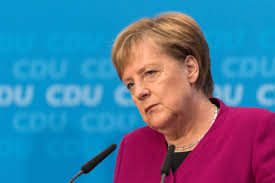German states agreed to push for an extension of sweeping closures and restrictions well into December, ahead of a conference with Chancellor Angela Merkel on Wednesday to coordinate the country’s response to the coronavirus pandemic.
Ahead of that meeting, the premiers of Germany’s 16 federal states held talks of their own on Monday to decide on their proposed course of action.
In a four-and-a-half-hour meeting on Monday night, the premiers agreed to propose extending the restrictions currently in place until December 20, dpa learned from participants.
A final decision is expected on Wednesday at Merkel’s talks with the state officials.
The chancellor is to make a statement in parliament on Thursday, government spokesman Steffen Seibert said.
As the state premiers met on Monday, the European Union’s disease control authority warned that the current measures in place were inadequate.
“There are nine countries where we predict that the current measures will not be sufficient to cause a downturn in the incidence of confirmed cases,” the Stockholm-based European Centre for Disease Prevention and Control (ECDC) reported.
It added that Germany was one of those countries, but also forecast that if the nine countries returned to the behaviour of early April, there would be reductions in infections, hospital stays, and deaths.
In their talks, the German premiers were also proposing a ban on the fireworks traditionally set off in Germany over the New Year period.
Merkel and other leading politicians have been preparing the German public for an extension to the current shutdown, which was initially announced for the month of November, as daily rises in confirmed infections remain stubbornly high.
“We have not yet come as far as we would like with the contact restrictions,” the German chancellor said on Sunday.
Berlin Mayor Michael Mueller, who currently speaks on behalf of the 16 state premiers under a rotational system, said in comments to dpa: “We agree that a lot has already been achieved, but not enough.”
Restaurants and pubs were shuttered again in Germany at the start of November, as were theatres, museums, and swimming pools.
The premiers are suggesting that restaurants, leisure, and cultural facilities that have been closed since the beginning of November remain closed.
Also under discussion are stricter contact restrictions for private meetings and possibly an expanded mask requirement in schools.
The country has been seeing record rises in new coronavirus infections since October, with daily numbers at times exceeding 20,000.
On Monday, the Robert Koch Institute (RKI) for disease control added 10,864 new cases to its tally of coronavirus infections confirmed in the nation so far. This was largely in line with the increase recorded on the same day last week.
The numbers are often lower on Mondays following a lag in testing over the weekend.
The total number of infections since the pandemic began now stands at 929,133, including 14,112 deaths from COVID-19, according to the RKI.
Merkel and the state premiers are under pressure to act on Wednesday, after they failed to agree on the next steps at their last meeting a week ago.
Merkel had been seeking expanded mask rules in schools and tougher limits on socialising.
Under Germany’s federal system, Merkel depends on the state leaders to enact sweeping policies designed to halt the spread of the virus.
She has held frequent meetings with them throughout the pandemic to coordinate a nationwide response, with varying degrees of success. (dpa)

